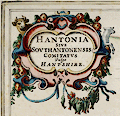
 Map Group BLACK 1870s
Map Group BLACK 1870s

These notes are taken from the Road and Railway Travelling Map of England, including England and Wales, engraved by S Hall, Bury Street, London, published by A and C Black, Edinburgh, Lothian, early 1870s. The map studied is in a private collection.





BLACK'S ROAD & RAILWAY TRAVELLING MAP OF ENGLAND 4s. 6d.illustrated with a 2-2-2 railway locomotive and a stage coach. Printed in a plain cartouche, in a decorative font is:-
ENGLAND AND WALESand printed at the bottom:-
Edinburgh, Published by A. & C. Black. / Engraved by S Hall, Bury Str. Bloomsbury

Railways in operation are distinguished thus [bold line, cross lines for a] Station
Lines in progress of construction, or which have received the sanction of Parliament [double line, shaded]
up is N
scale
English Mileschequered in 5 then 10 miles intervals, labelled at 5, 10, 20, etc. The 50 miles = 88.8 mm gives a scale 1 to 906162. The map scale is about:-
1 to 900000
14 miles to 1 inch
lat and long grid
Longitude East from Greenwichto the right of the prime meridian.
The map includes from about 1d 30m E to 5d 40m W, from 49d 40m to 56d 10m N; the whole of England and Wales, with southern Scotland in outline, and part of the coast of France.
sea tinted
ENGLISH CHANNEL
The Solent
Spithead
Some headlands are noticed, eg:-
Hurst Pt.Hampshire's harbours are all recognisable, but not labelled.
castles
Calshot Ca.
Avon R.
R. ItchenIn Hampshire the following rivers can be recognised: River Stour, River Avon, Avon Water, Lymington River, Beaulieu River, Rivers Test, Dun, Anton, and Dever, River Itchen and Candovers Stream, River Hamble, River Meon, Wallington River, River Rother, two parts of the River Wey, Blackwater River, River Hart, Rivers Loddon, Lyde, etc, and the River Enborne. This is all the major rivers and some tributaries.
hill hachuring
NEW FORESTis labelled as an area.
HAMPSHIRE OR SOUTHAMPTONEach county is coloured a different colour. For example: Hampshire and Isle of Wight yellow, Dorset green, Wiltshire orangey red, Berkshire green, Surrey orangey red, Sussex pinky red. Elsewhere a grey blue is used. Thus at least five colours, two of which are badly similar.
WINCHESTER
Lymington [with cross]
Alton [without cross]The spellings of the placenames of the '21' market towns are listed below.
hamlet
E. Worldham
Upper Wallop
Although the cover title says this is a road and rail map, it is apparent that railways are a prior interest.
Basingstoke Canalis drawn by a bold curvy line, and labelled.


London and Southampton Railway, 1840
Bishopstoke to Gosport branch railway 1842
Chichester to Portsmouth branch railway 1847
Southampton and Dorchester Railway 1847
Berkshire and Hampshire Railway 1848
Reading, Guildford and Reigate Railway 1849
Farnham to Alton branch railway 1852
Basingstoke and Salisbury Railway 1857
Lymington Railway 1858
Portsmouth Railway 1859
Bishops Waltham Railway 1863
Petersfield Railway 1864
Andover and Redbridge Railway 1865
Mid Hants, Alton Lines, Railway 1865
Salisbury and Dorset Junction Railway 1866
Southampton and Netley Railway 1866 (NOT the extension to Fareham 1889)
Ringwood, Christchurch and Bournemouth Railway 1862 and 1870The names are those used in the directory of railways in the Old Hampshire Gazetteer, with the dates of opening.
The Hayling Railway 1867 and Stokes Bay Railway 1863 are missing, otherwise all railways up to 1870 are shown. The Didcot, Swindon and Southampton Railway, authorised in 1873, is not shown as a line in progress. Allowing for mistakes it seems the map dates from the period 1870-75.


Alton
Andover
Basingstoke
Bishops Waltham
Christ Church
Fareham
Fordingbridge
Gosport
Havant
Kingsclare (spelling mistake?)
Lymington
Alresford
Odiham
Petersfield
Portsmouth
Ringwood
Romsey
Southampton
Stockbridge
Whitchurch
Winchester




